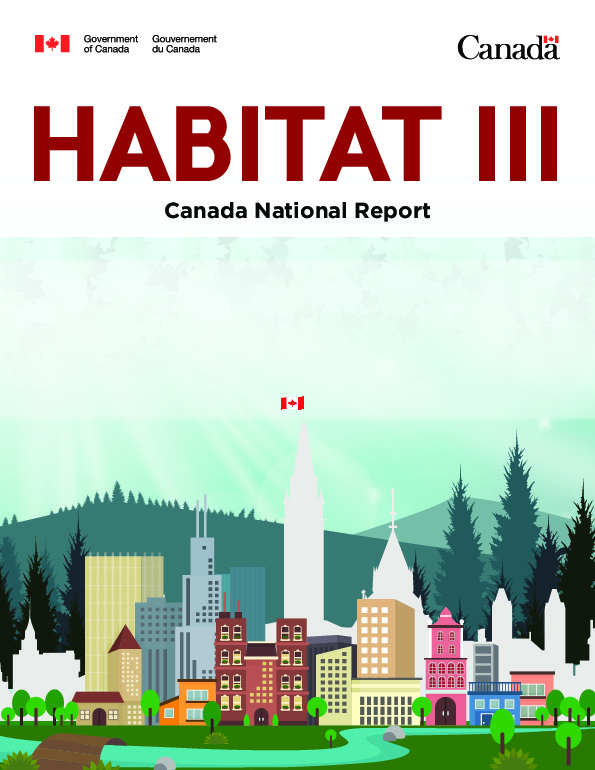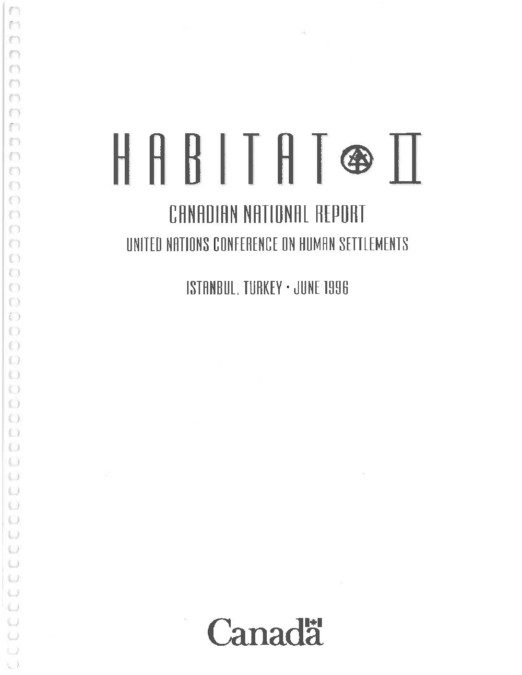

Canada
Urban indicators:
| Value | Year | ||
| Surface area (sq km) | 9984670 | 2014 | |
| Population (proj., 000) | 36286 | 2016 | |
| Pop. density (per sq km) | 4.0 | 2016 | |
| Capital city | Ottawa | 2015 | |
| Capital city pop. (000) | 1326 | 2015 | Refers to Ottawa-Gatineau, the Census Metropolitan Area. |
| Population growth rate (average annual %) | 1.0 | 2010-2015 | |
| Urban population growth rate (average annual %) | 1.2 | 2010-2015 | |
| CO2 emission estimates (000 tons/tons per capita) | 475735/13.5 | 2013 | |
| Population using improved drinking water sources (urban/rural, %) | 100.0/99.0 | 2015 | |
| Population using improved sanitation facilities (urban/rural, %) | 100.0/99.0 | 2015 |
| 1995 | 2005 | 2014/2015 | |
| Urban population ('000) | 22,755 | 25,842 | 29,353 |
| Level of urbanization (%) | 77.7 | 80.1 | 81.8 |
National Report:
National Report Executive Summary:
Over the last four decades, the United Nations’ Habitat Conference on Housing and Sustainable Urban Development has sought to address the challenges associated with creating suitable, affordable, and sustainable living spaces. Since the inaugural meeting held in Vancouver in 1976, issues of adequate housing and support for vulnerable populations have continued to evolve. Today, as the international community looks ahead to the next twenty years, the Habitat III New Urban Agenda is attempting to anticipate and address the challenges of rapid urbanization.
Building a more fair, inclusive and equitable society starts with understanding the difficulties faced by all citizens, including its most vulnerable groups, such as immigrants, youth, seniors, Indigenous Peoples, persons with disabilities, and those without homes. Canada is taking a number of measures to enhance the lives of its citizens, including offering immediate help to those who need it most, while continuing to support sustained economic growth.
Canada recognizes poverty, sustainability and inclusivity are complex issues which require a forward-looking vision. Governments are committed to working in cooperation with civil society organizations and the private sector to develop solutions which extend beyond bricks and mortar. For example, the Government is currently developing the Canadian Poverty Reduction Strategy that will set targets to reduce poverty while publicly measuring and reporting on progress. Furthermore, Canada is developing a long-term National Housing Strategy to meet the needs of all citizens, now and for future generations. This strategy reaffirms a commitment to poverty reduction, job creation and environmental sustainability in creating healthy, inclusive communities.
Prosperous cities also ensure the health and safety of their inhabitants. New programs are being implemented to protect the safety of women and those living in Indigenous communities. This includes investment in shelters, victim support services and measures aimed at addressing the underlying causes of violence among vulnerable groups.
Along with a renewed approach to fostering innovation, Canadian cities are places of opportunity for all. A clean environment is closely tied to quality of life and local resilience. From reducing greenhouse gas emissions (GHG) to transforming the way we live, work and move around our communities, Canada is committed to taking a global leadership role in addressing the challenges of climate change through green investment, green technology and the National Climate Plan.
Looking ahead, governments are working together to meet the needs of the present and future generations by advancing the priorities as set out in the New Urban Agenda for the Habitat III Summit. Canada remains committed to improving the standard of living for all, shaping cities and rural areas to meet the challenges of tomorrow, conserving the environment, and advancing long-term economic competitiveness. Finding innovative solutions to the shared challenges facing communities will not be easy. However, through the integration of environmental, economic and social programs, as well as the unified action of citizens, industry, civil society, and governments, we can collectively work towards ensuring that communities will be healthy and productive places to live, where all Canadians have a real and fair chance to succeed.
Statements by Canada:
-
Habitat III Plenaries
-
Intersessionals: Informal Intergovernmental Meetings (May 2016)
Comments on Preparatory Process Documents:
Events:
- At the Habitat III Conference:


Beyond Bricks and Mortar: Leveraging Partnerships for a New Approach to Housing
- More events:

Thematic Meeting: Metropolitan Areas

Urban Journalism Academy During Thematic Meeting on Metropolitan Areas

Smart City Expo World Congress



